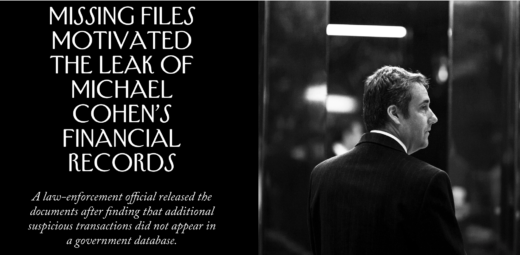I have no time to post right now, but I wanted to pass along a link to Ronan Farrow’s new article in the New Yorker, which is all about the circumstances surrounding the release of Michael Cohen’s banking records last week. It’s really incredible stuff… Not only does it look as though there were several other fishy Cohen accounts, though with several millions of dollars flowed between he election and the inauguration, but, according to the whistleblower who went public with the information, the reason he did so was because Suspicious Activity Reports (SARs) involving the Cohen accounts, which had been in the Treasury Department system, were beginning to disappear… Here’s how the article begins.
Last week, several news outlets obtained financial records showing that Michael Cohen, President Trump’s personal attorney, had used a shell company to receive payments from various firms with business before the Trump Administration. In the days since, there has been much speculation about who leaked the confidential documents, and the Treasury Department’s inspector general has launched a probe to find the source. That source, a law-enforcement official, is speaking publicly for the first time, to The New Yorker, to explain the motivation: the official had grown alarmed after being unable to find two important reports on Cohen’s financial activity in a government database. The official, worried that the information was being withheld from law enforcement, released the remaining documents.
The payments to Cohen that have emerged in the past week come primarily from a single document, a “suspicious-activity report” filed by First Republic Bank, where Cohen’s shell company, Essential Consultants, L.L.C., maintained an account. The document detailed sums in the hundreds of thousands of dollars paid to Cohen by the pharmaceutical company Novartis, the telecommunications giant A.T. & T., and an investment firm with ties to the Russian oligarch Viktor Vekselberg.
The report also refers to two previous suspicious-activity reports, or sars, that the bank had filed, which documented even larger flows of questionable money into Cohen’s account. Those two reports detail more than three million dollars in additional transactions—triple the amount in the report released last week. Which individuals or corporations were involved remains a mystery. But, according to the official who leaked the report, these sars were absent from the database maintained by the Treasury Department’s Financial Crimes Enforcement Network, or fincen. The official, who has spent a career in law enforcement, told me, “I have never seen something pulled off the system…. That system is a safeguard for the bank. It’s a stockpile of information. When something’s not there that should be, I immediately became concerned.” The official added, “That’s why I came forward”…
So, not only is it true that the Donald Trump’s fixer was shaking down corporations, demanding cash payments to a shell company in exchange for access to the a thoroughly corrupt administration, but it now looks as though someone within Steven Mnuchin’s Treasury Department may have purposefully been deleting reports of suspicious banking activity engaged in by that same fixer. [It may also be true, as Farrow concedes, that these reports could have been removed for other reasons, although I think that’s probably a much less likely scenario, given that it would run contrary to every accepted practice with regard to the federal tracking of suspicious financial events.] This, I don’t think I need to tell most of you, is not at all normal.
Oh, and it’s also worth noting that the Senate Intelligence Committee came out today in support of “the intelligence community’s conclusion that Russia, on orders from Putin, carried out an unprecedented election interference effort to help the Trump campaign and hurt the Clinton campaign in 2016”. [The quote is from Mark Warner, the vice chair of the Senate committee. The official statement, titled “Assessing Russian Activities and Intentions in Recent US Elections,” can be found here.] This, of course, directly contradicts the “findings” of the fake House Intelligence Committee investigation which was run by Trump’s friend, Devin Nunes.
update: Here’s Farrow on Good Morning America, discussing this most recent bombshell.
Michael Cohen's money trail mystery – a new report shows some of the attorney's financial records are missing. @RonanFarrow joins @TomLlamasABC and @GStephanopoulos in Times Square… pic.twitter.com/WlVu3dFGwG
— Good Morning America (@GMA) May 17, 2018













6 Comments
Let me be the first to suggest that Steven Mnuchin will be going to prison.
I suppose there’s a remote chance that law enforcement removed the files from the database, but, according to Farrow, it’s something that life-long Treasury Department employees have never seen… and it was shocking enough that one government official risked five years in prison to share the file that still remained. That, I think, is telling.
You are wasting your time. Giuliani says that Mueller can’t indict the president. #MAGA
https://politi.co/2L8JKtp
Democrats have questioned whether Steve Mnuchin’s role as Trump’s campaign finance chairman created a conflict now that he’s overseeing agencies looking into Russian interference.
Tonight, the Treasury Inspector General said it won’t pursue a probe.
https://twitter.com/kylegriffin1/status/996933531342434304
CNBC: “The Senate Finance Committee’s ranking Democrat asks the Treasury Department’s inspector general to examine allegedly missing bank reports that are said to detail suspicious activity in an account of Trump attorney Michael Cohen.”
Read more:
https://www.cnbc.com/2018/05/17/trump-lawyers-missing-suspicious-activity-docs-caused-leak-report.html
“The Vietnam War years were the most ‘politicized’ of my life. I spent my days during this war writing fiction, none of which on the face of it would appear to connect to politics. But by being ‘politicized’ I mean something other than writing about politics or even taking direct political action. I mean something akin to what ordinary citizens experience in countries like Czechoslovakia or Chile: a daily awareness of government as a coercive force, its continuous presence in one’s thoughts as far more than just an institutionalized system of regulations and controls. In sharp contrast to Chileans or Czechs, we hadn’t personally to fear for our safety and could be as outspoken as we liked, but this did not diminish the sense of living in a country with a government out of control and wholly in business for itself. Reading the morning New York Times and the afternoon New York Post, watching the seven and then the eleven o’clock TV news—all of which I did ritualistically—became for me like living on a steady diet of Dostoevsky. Rather than fearing for the well-being of my own kin and country, I now felt toward America’s war mission as I had toward the Axis goals in World War II. One even began to use the word ‘America’ as though it was the name not of the place where one had been raised to which one had a patriotic attachment, but of a foreign invader that had conquered the country and with whom one refused, to the best of one’s strength and ability, to collaborate. Suddenly America had turned into ‘them’—and with this sense of dispossession came the virulence of feeling and rhetoric that often characterized the anti-war movement.
…Of course there have been others as venal and lawless [as Richard Nixon] in American politics, but even a Joe McCarthy was more identifiable as human clay than this guy is. The wonder of Nixon (and contemporary America) is that a man so transparently fraudulent, if not on the edge of mental disorder, could ever have won the confidence and approval of a people who generally require at least a little something of the ‘human touch’ in their leaders. It’s strange that someone so unlike the types most admired in the average voter…could have passed himself off to this Saturday Evening Post America as, of all things, an American.”
—Philip Roth, 1974